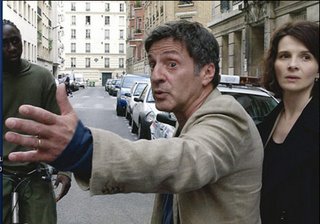Hidden (or Caché), a movie by Michael Haneke
 Completely coincidentally, this movie also has as part of its structure the continuing tension between the French and Moslems: specifically a situation several decades earlier in which there were a lot of Algerian immigrants and, on one brutal day in 1961, around 200 of them were pushed into the Seine, presumably to drown.
Completely coincidentally, this movie also has as part of its structure the continuing tension between the French and Moslems: specifically a situation several decades earlier in which there were a lot of Algerian immigrants and, on one brutal day in 1961, around 200 of them were pushed into the Seine, presumably to drown.The film opens with what seems to be a long take of the outside of a suburban house, every so often we see and hear people passing by. It turns out that we are watching a video with Georges (Daniel Auteuil) and Anne (Juliet Binoche). He is the host of a television literature programme - they have an amazing range of bookcases that I'd have loved to explore. They don't, however, seem to be much of a couple - there is very little intimacy between them, no touching at all, and they set about their discussions like a pair of students assigned to do a piece of group work. All the while, the camera is right in there with them - either the camera making the film we are watching or the camera making the film they are watching.
So, this tape has been left on their doorstep and has obviously been filmed by someone sitting in the lane leading to their house. Having something unusual and slightly spooky like this happen proves to insert the point of a pick axe into a fissure of guilt Georges has long suppressed. They get three tapes like this one, then one further tape showing the location of another apartment, together with a few cards - one has a crudely drawn (as if by a child says someone) human head with a blood red tongue protruding, another is of a chicken with a big gash in its neck - and that is enough to unravel our hero.
These send Georges mental: he goes to the apartment shown in the tape, and finds an Algerian fellow, Majid, who his family had taken in as a farm worker all those years ago when he was six. Georges blames Majid for sending the tapes, and simply can't listen to his denial. So, our middle class and well established Georges is threatening Majid with all sorts of dire consequences, yet pretends to his wife that he never found him. Bad move because, sure enough, another tape turns up - making her really wonder what is going on, now that Georges is outed as a liar and a bully. What else is there?
Then their son doesn't come home: of course, Majid has kidnapped him (not!). I think that this is the power of the film: Georges guilt about what he did to Majid 30 years ealier means that he cannot now process reality, thinks that since he is to blame then everything bad that happens must be Majid or his son taking vengeance when, as the son says, he's been educated and simply doesn't think in that way.
The film ends with a scene that shocked pretty much everyone in the theatre - I guessed what was about to happen a mere second before it did - with us left with Mojid and the son both denying anything to do with the video tapes and us no closer to knowing who sent them. Well, me anyway: apparently there is an answer given in the very last shot, but I missed it! In my defence, it was another fairly long take with the credits running, so I had distractions.
I don't however, think the movie is just about Georges and Mojid, but more f a commentaty on contemporary France - people like Georges and those he is interviewing and those who are watching have their comfortable lives on the back of a pretty unsavoury past, features of which are still present. There's a scene in which Georges merrily walks out into the road between two cars, not watching at all, and is nearly skittled by a black man (i.e. immigrant) on a bicycle: Georges self righteously is about to climb all over the fellow on the bike, for daring to be there where he ought not. Luckily Anne intervenes and points out some good sense.


0 Comments:
Post a Comment
Subscribe to Post Comments [Atom]
<< Home